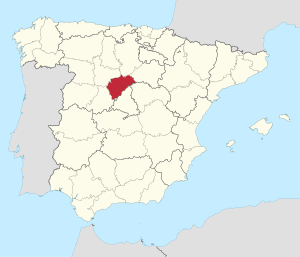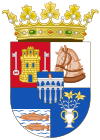Province of Segovia facts for kids
Quick facts for kids
Segovia
|
|||
|---|---|---|---|
|
|||

Map of Spain with Segovia highlighted
|
|||
| Country | Spain | ||
| Autonomous community | |||
| Capital | Segovia | ||
| Area | |||
| • Total | 6,920.65 km2 (2,672.08 sq mi) | ||
| Area rank | Ranked 37th | ||
| 1.35% of Spain | |||
| Population
(2012)
|
|||
| • Total | 163,701 | ||
| • Rank | Ranked 48th | ||
| • Density | 23.65399/km2 (61.26356/sq mi) | ||
| 0.35% of Spain | |||
| Demonym(s) | Spanish: Segoviano/a | ||
| Official language(s) | Spanish | ||
| Parliament | Cortes Generales | ||
Segovia is a beautiful province located in the heart of Spain. It is found in the southern part of the autonomous community of Castile and León. This area is known for its rich history and stunning landscapes.
The province of Segovia shares its borders with several other Spanish provinces. To the north, you'll find Burgos. To the northeast, it borders Soria, and to the east, Guadalajara. South of Segovia is Madrid. To the west and southwest, it borders Ávila, and to the northwest, Valladolid.
Contents
Discovering Segovia Province
Segovia province is a fascinating place with a long history. It is famous for its ancient Roman structures and medieval castles. The capital city, also called Segovia, is a UNESCO World Heritage Site. This means it is recognized as a very important place for everyone in the world to protect.
Geography and Nature
Segovia province is located in a region with diverse landscapes. You can find mountains, rivers, and plains here. The Sierra de Guadarrama mountain range forms part of its southern border. These mountains are popular for hiking and enjoying nature.
The province has a continental climate. This means it has cold winters and hot summers. The natural environment is home to various plants and animals. Forests of pine and oak trees are common.
Rivers and Waterways
Several rivers flow through Segovia province. The Eresma River and the Cega River are two important ones. These rivers help irrigate the land, making it suitable for farming. They also create beautiful river valleys.
History of Segovia
The history of Segovia dates back thousands of years. It was an important area even in ancient times. The Romans built amazing structures here, which you can still see today.
Roman Influence
One of the most famous Roman structures is the Aqueduct of Segovia. This incredible aqueduct was built to carry water into the city. It is made of huge stone blocks fitted together without mortar. It shows how advanced Roman engineering was.
Medieval Times and Castles
During the Middle Ages, Segovia became a significant kingdom. Many castles and fortresses were built to protect the area. The Alcázar of Segovia is a famous example. It looks like a fairy-tale castle and has served as a royal palace and a prison.
Culture and Traditions
Segovia province has a rich cultural heritage. Its traditions are deeply rooted in Spanish history. Festivals, food, and local crafts are important parts of life here.
Local Cuisine
The province is known for its delicious food. A famous dish is cochinillo asado, which is roasted suckling pig. Another popular food is judiones de La Granja, large white beans. These dishes are often enjoyed during local celebrations.
Festivals and Celebrations
Throughout the year, Segovia hosts many traditional festivals. These events often include parades, music, and dancing. They are a great way to experience the local culture and community spirit.
Economy and Life
The economy of Segovia province relies on several key areas. These include agriculture, tourism, and some industries.
Agriculture and Farming
Farming has always been important in Segovia. People grow crops like cereals, potatoes, and vegetables. Livestock farming, especially sheep and pigs, is also common.
Tourism and Visitors
Tourism is a major part of the economy. Many people visit Segovia to see its historical sites. The Aqueduct, the Alcázar, and the Segovia Cathedral attract visitors from all over the world. This helps support local businesses and jobs.
Local Government
The province is governed by a provincial council. This council works to improve public services and develop the region. The capital city, Segovia, is the main center for government and business.
See also
 In Spanish: Provincia de Segovia para niños
In Spanish: Provincia de Segovia para niños
 | Chris Smalls |
 | Fred Hampton |
 | Ralph Abernathy |



